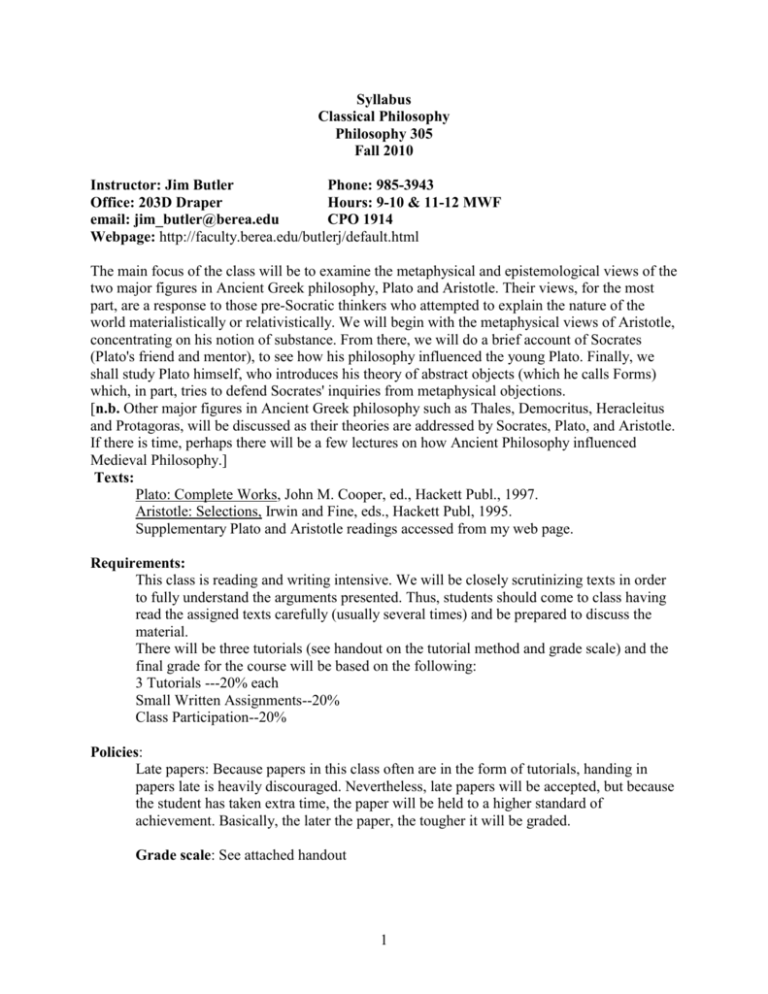Syllabus
advertisement

Syllabus Classical Philosophy Philosophy 305 Fall 2010 Instructor: Jim Butler Phone: 985-3943 Office: 203D Draper Hours: 9-10 & 11-12 MWF email: jim_butler@berea.edu CPO 1914 Webpage: http://faculty.berea.edu/butlerj/default.html The main focus of the class will be to examine the metaphysical and epistemological views of the two major figures in Ancient Greek philosophy, Plato and Aristotle. Their views, for the most part, are a response to those pre-Socratic thinkers who attempted to explain the nature of the world materialistically or relativistically. We will begin with the metaphysical views of Aristotle, concentrating on his notion of substance. From there, we will do a brief account of Socrates (Plato's friend and mentor), to see how his philosophy influenced the young Plato. Finally, we shall study Plato himself, who introduces his theory of abstract objects (which he calls Forms) which, in part, tries to defend Socrates' inquiries from metaphysical objections. [n.b. Other major figures in Ancient Greek philosophy such as Thales, Democritus, Heracleitus and Protagoras, will be discussed as their theories are addressed by Socrates, Plato, and Aristotle. If there is time, perhaps there will be a few lectures on how Ancient Philosophy influenced Medieval Philosophy.] Texts: Plato: Complete Works, John M. Cooper, ed., Hackett Publ., 1997. Aristotle: Selections, Irwin and Fine, eds., Hackett Publ, 1995. Supplementary Plato and Aristotle readings accessed from my web page. Requirements: This class is reading and writing intensive. We will be closely scrutinizing texts in order to fully understand the arguments presented. Thus, students should come to class having read the assigned texts carefully (usually several times) and be prepared to discuss the material. There will be three tutorials (see handout on the tutorial method and grade scale) and the final grade for the course will be based on the following: 3 Tutorials ---20% each Small Written Assignments--20% Class Participation--20% Policies: Late papers: Because papers in this class often are in the form of tutorials, handing in papers late is heavily discouraged. Nevertheless, late papers will be accepted, but because the student has taken extra time, the paper will be held to a higher standard of achievement. Basically, the later the paper, the tougher it will be graded. Grade scale: See attached handout 1 Regular attendance is a requirement of the class. Those students who miss a substantial amount of class will be penalized on their final grades. No form of academic dishonesty will be tolerated. For definitions of academic dishonesty, see Student Handbook for more details. Disability Statement: Students who have a disability that may prevent them from fully demonstrating their abilities should contact the Disability Services Coordinator, Cindy Reed at (859) 985-3212, or e-mail cynthia_reed@berea.edu, to discuss accommodations necessary to ensure full participation in this course. Upon request, this syllabus can be made available in alternative forms. TENTATIVE SCHEDULE [Notice that this syllabus is tentative. We may, depending on the amount of discussion, end up going slightly faster or slower than the syllabus states. So, do not simply follow the syllabus outline. I will always announce in class upcoming assignments. So if you miss class, it is your responsibility to find out what the assignments are for the upcoming classes.] All the assignments to be found on the web are in BOLD WEEK 1 Introduction: Socrates, Plato, and Aristotle WEEK 2 Introduction to Aristotle: Categories 1-5 and Topics I.4, 5, 9 Short Paper WEEK 3 Aristotle's early theory of substance and change Physics I.1 & 5-8 & I.2-3 Generation and Corruption I.3-5 ff WEEK 4 Living things, the 4 causes, and teleology Physics. II.1-3, 5 & 8 Parts of Animals I.1 First tutorial: Aristotle on Natures WEEK 5 Aristotle's later theory of substances and his Meta VII (whole chapter) On the Soul I.1 & II.1-4 Meta XII. 6-7ff (Prime mover) WEEK 6 Aristotle’s rejection of Protagoras and Heracleitus Meta IV.1-5 WEEK 7 Aristotle vs. Plato Meta. I.6-9, XIII.5 (re-read VII.13-15) Generation and Corruption. II.9 2 Nic. Ethics I.6 WEEK 8 Brief Overview of Socrates The Apology, Protagoras, Laches Short paper WEEK 9 Introduction to Plato and his theory of Forms Phaedo WEEK 10 Forms in The Republic Second tutorial: Lovers of Sights and Sounds WEEK 11 Other arguments for the Forms Symposium, Cratylus WEEK 12 Plato's later theory of Forms and the Third Man Argument Parmenides, Sophist, Timaeus Short paper WEEK 13 False mental states Theaetetus, Philebus (w/ Republic IX) WEEK 14 Plato's rejection of Protagorean relativism Protagoras, Cratylus, Theaetetus Final Tutorial 3







